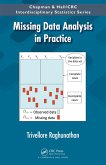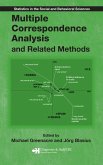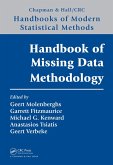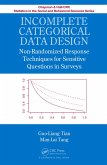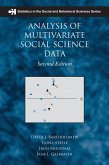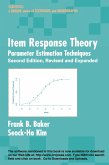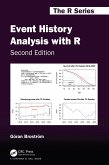Analysis of Distributional Data (eBook, ePUB)
Redaktion: Brito, Paula; Dias, Sonia
48,95 €
48,95 €
inkl. MwSt.
Sofort per Download lieferbar

24 °P sammeln
48,95 €
Als Download kaufen

48,95 €
inkl. MwSt.
Sofort per Download lieferbar

24 °P sammeln
Jetzt verschenken
Alle Infos zum eBook verschenken
48,95 €
inkl. MwSt.
Sofort per Download lieferbar
Alle Infos zum eBook verschenken

24 °P sammeln
Analysis of Distributional Data (eBook, ePUB)
Redaktion: Brito, Paula; Dias, Sonia
- Format: ePub
- Merkliste
- Auf die Merkliste
- Bewerten Bewerten
- Teilen
- Produkt teilen
- Produkterinnerung
- Produkterinnerung

Bitte loggen Sie sich zunächst in Ihr Kundenkonto ein oder registrieren Sie sich bei
bücher.de, um das eBook-Abo tolino select nutzen zu können.
Hier können Sie sich einloggen
Hier können Sie sich einloggen
Sie sind bereits eingeloggt. Klicken Sie auf 2. tolino select Abo, um fortzufahren.

Bitte loggen Sie sich zunächst in Ihr Kundenkonto ein oder registrieren Sie sich bei bücher.de, um das eBook-Abo tolino select nutzen zu können.
In the era of "Big Data," distributional data is becoming more prevalent. This book presents a synthesis of research in this area over the last twenty years. It has been carefully edited to ensure it is consistent with respect to style, level, notation. Each chapter includes examples to illustrate the topics and software where appropriate.
- Geräte: eReader
- mit Kopierschutz
- eBook Hilfe
Andere Kunden interessierten sich auch für
![Missing Data Analysis in Practice (eBook, ePUB) Missing Data Analysis in Practice (eBook, ePUB)]() Trivellore RaghunathanMissing Data Analysis in Practice (eBook, ePUB)48,95 €
Trivellore RaghunathanMissing Data Analysis in Practice (eBook, ePUB)48,95 €![Multiple Correspondence Analysis and Related Methods (eBook, ePUB) Multiple Correspondence Analysis and Related Methods (eBook, ePUB)]() Multiple Correspondence Analysis and Related Methods (eBook, ePUB)52,95 €
Multiple Correspondence Analysis and Related Methods (eBook, ePUB)52,95 €![Handbook of Missing Data Methodology (eBook, ePUB) Handbook of Missing Data Methodology (eBook, ePUB)]() Handbook of Missing Data Methodology (eBook, ePUB)61,95 €
Handbook of Missing Data Methodology (eBook, ePUB)61,95 €![Incomplete Categorical Data Design (eBook, ePUB) Incomplete Categorical Data Design (eBook, ePUB)]() Guo-Liang TianIncomplete Categorical Data Design (eBook, ePUB)64,95 €
Guo-Liang TianIncomplete Categorical Data Design (eBook, ePUB)64,95 €![Analysis of Multivariate Social Science Data (eBook, ePUB) Analysis of Multivariate Social Science Data (eBook, ePUB)]() David J. BartholomewAnalysis of Multivariate Social Science Data (eBook, ePUB)57,95 €
David J. BartholomewAnalysis of Multivariate Social Science Data (eBook, ePUB)57,95 €![Item Response Theory (eBook, ePUB) Item Response Theory (eBook, ePUB)]() Item Response Theory (eBook, ePUB)45,95 €
Item Response Theory (eBook, ePUB)45,95 €![Event History Analysis with R (eBook, ePUB) Event History Analysis with R (eBook, ePUB)]() Göran BroströmEvent History Analysis with R (eBook, ePUB)48,95 €
Göran BroströmEvent History Analysis with R (eBook, ePUB)48,95 €-
-
-
In the era of "Big Data," distributional data is becoming more prevalent. This book presents a synthesis of research in this area over the last twenty years. It has been carefully edited to ensure it is consistent with respect to style, level, notation. Each chapter includes examples to illustrate the topics and software where appropriate.
Dieser Download kann aus rechtlichen Gründen nur mit Rechnungsadresse in A, B, BG, CY, CZ, D, DK, EW, E, FIN, F, GR, HR, H, IRL, I, LT, L, LR, M, NL, PL, P, R, S, SLO, SK ausgeliefert werden.
Produktdetails
- Produktdetails
- Verlag: Taylor & Francis eBooks
- Seitenzahl: 404
- Erscheinungstermin: 26. April 2022
- Englisch
- ISBN-13: 9781315353456
- Artikelnr.: 63531946
- Verlag: Taylor & Francis eBooks
- Seitenzahl: 404
- Erscheinungstermin: 26. April 2022
- Englisch
- ISBN-13: 9781315353456
- Artikelnr.: 63531946
- Herstellerkennzeichnung Die Herstellerinformationen sind derzeit nicht verfügbar.
Paula Brito is a Professor at the Faculty of Economics of the University of Porto, and a member of the Artificial Intelligence and Decision Support Research Group (LIAAD) of INESC TEC, Portugal. She holds a doctorate degree in Applied Mathematics from the University Paris Dauphine, and an Habilitation in Applied Mathematics from the University of Porto. Her current research focuses on the analysis of multidimensional complex data, known as symbolic data, for which she develops statistical approaches and multivariate analysis methodologies. In this context, she has been involved in two European research projects. Paula Brito has been president of the International Association for Statistical Computing (IASC-ISI) in 2013-2015, and of the Portuguese Association for Classification and Data Analysis for the term 2021-2023. She has been invited speaker at several international conferences, and is a regularly member of international program committees. Paula Brito has been chair of COMPSTAT 2008 and will co-chair the IFCS 2022 conference. Sónia Dias is a Professor in the area of Mathematics at the School of Technology and Management of the Polytechnic Institute of Viana do Castelo, and a member of the Laboratory in Artificial Intelligence and Decision Support (LIAAD) of INESC TEC, Portugal. She holds a PhD in Applied Mathematics from the University of Porto (2014). Her main scientific areas of research are Data Analysis, Symbolic Data Analysis (analysis of multidimensional complex data) and Statistical/Mathematical Applications. Under this context, she has participated in several conferences and published articles in international journals and proceedings. She was a member of the organizing committee of the international Symbolic Data Analysis Workshop - SDA2018 and is a member of the organizing committee of the IFCS 2022 conference.
I Data Representation and Exploratory Analysis
1. Fundamental Concepts about Distributional Data
2. Descriptive Statistics based on Frequency Distributions
3. Descriptive Statistics for Numeric Distributional Data
4. The Quantile Methods to Analyze Distributional Data
II Clustering and Classification
5. Partitive and Hierarchical Clustering of Distributional Data using the
Wasserstein Distance
6. Divisive clustering of histogram data
7. Clustering of Modal Valued Data
8. Mixture Models for Distributional Data
9. Classification of Continuous Distributional Data Using the Logratio
Approach
III Dimension Reduction
10. Principal Component Analysis of Distributional Data
11. Principal Component Analysis of Numeric Distributional Data
12. Multidimensional Scaling of Distributional Data
IV Regression and Forecasting
13. Regression Analysis with the Distribution and Symmetric Distribution
Model
14. Regression Analysis of Distributional Data Based on a Two-Component
Model
15. Forecasting Distributional Time Series
1. Fundamental Concepts about Distributional Data
2. Descriptive Statistics based on Frequency Distributions
3. Descriptive Statistics for Numeric Distributional Data
4. The Quantile Methods to Analyze Distributional Data
II Clustering and Classification
5. Partitive and Hierarchical Clustering of Distributional Data using the
Wasserstein Distance
6. Divisive clustering of histogram data
7. Clustering of Modal Valued Data
8. Mixture Models for Distributional Data
9. Classification of Continuous Distributional Data Using the Logratio
Approach
III Dimension Reduction
10. Principal Component Analysis of Distributional Data
11. Principal Component Analysis of Numeric Distributional Data
12. Multidimensional Scaling of Distributional Data
IV Regression and Forecasting
13. Regression Analysis with the Distribution and Symmetric Distribution
Model
14. Regression Analysis of Distributional Data Based on a Two-Component
Model
15. Forecasting Distributional Time Series
I Data Representation and Exploratory Analysis
1. Fundamental Concepts about Distributional Data
2. Descriptive Statistics based on Frequency Distributions
3. Descriptive Statistics for Numeric Distributional Data
4. The Quantile Methods to Analyze Distributional Data
II Clustering and Classification
5. Partitive and Hierarchical Clustering of Distributional Data using the
Wasserstein Distance
6. Divisive clustering of histogram data
7. Clustering of Modal Valued Data
8. Mixture Models for Distributional Data
9. Classification of Continuous Distributional Data Using the Logratio
Approach
III Dimension Reduction
10. Principal Component Analysis of Distributional Data
11. Principal Component Analysis of Numeric Distributional Data
12. Multidimensional Scaling of Distributional Data
IV Regression and Forecasting
13. Regression Analysis with the Distribution and Symmetric Distribution
Model
14. Regression Analysis of Distributional Data Based on a Two-Component
Model
15. Forecasting Distributional Time Series
1. Fundamental Concepts about Distributional Data
2. Descriptive Statistics based on Frequency Distributions
3. Descriptive Statistics for Numeric Distributional Data
4. The Quantile Methods to Analyze Distributional Data
II Clustering and Classification
5. Partitive and Hierarchical Clustering of Distributional Data using the
Wasserstein Distance
6. Divisive clustering of histogram data
7. Clustering of Modal Valued Data
8. Mixture Models for Distributional Data
9. Classification of Continuous Distributional Data Using the Logratio
Approach
III Dimension Reduction
10. Principal Component Analysis of Distributional Data
11. Principal Component Analysis of Numeric Distributional Data
12. Multidimensional Scaling of Distributional Data
IV Regression and Forecasting
13. Regression Analysis with the Distribution and Symmetric Distribution
Model
14. Regression Analysis of Distributional Data Based on a Two-Component
Model
15. Forecasting Distributional Time Series

